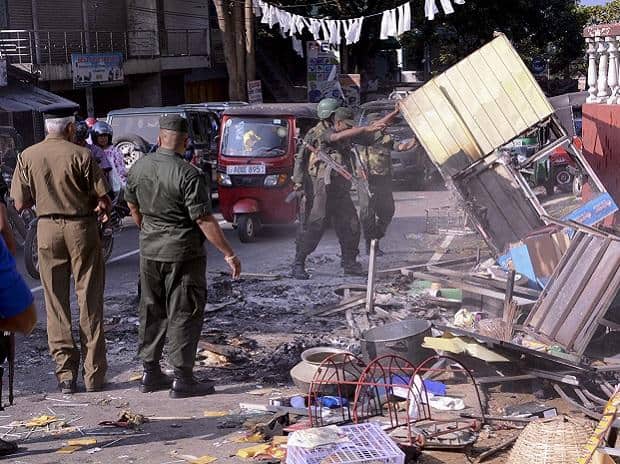COLOMBO: Despite state of emergency imposed in Sri Lanka, Buddhist extremists clash with police
and set ablaze a Muslim man’s shop and attacked a Mosque in Ampara.
Police fired teargas shells to disperse rioters.
More than 150 homes, mosques, shops and vehicles were set ablaze during two days of rioting. Two people were also killed in the unrest.
Tensions rose on Tuesday as the body of a 24-year-old Muslim man was pulled out of a burnt building.
Sri Lanka’s parliament Tuesday issued an apology to the Muslim minority, which constitutes 10 percent of the country’s population of 21 million.
“We want to apologise to the Muslim community for the inhuman acts that have taken place,” state enterprise development minister Lakshman Kiriella said in parliament.
Riots erupted on Monday after a man from the mainly Buddhist Sinhalese majority died at the hands of a Muslim mob last week.
Mobs set fire to Muslim-owned businesses and attacked a mosque in the east of the country last week after a Muslim chef was accused of adding contraceptives to food sold to Sinhalese customers.
The curfew was lifted last morning but was re-imposed soon after several mosques, shops and homes belonging to the minority community were badly damaged in the attacks by the Sinhalese Buddhists.
Sri Lanka has a long history of state of emergency during the LTTE rebellion both in the south and the Tamil minority dominated north and east of the island.
Schools across Kandy, 115 kilometres (72 miles) east of Colombo, remained closed Wednesday as the government ordered more troops to reinforce police and stop the unrest spreading.
The Sri Lanka government also has restricted the access to internet and blocked social media site — Facebook in the Kandy district.
This has been done to prevent spread of false information, the government spokesperson said.
The government ordered more troops to reinforce police and stop the unrest spreading.
Three special police teams, comprising three Deputy Inspector Generals of Police and three Superintendents of Police, have been deployed in Kandy on the instructions of the Inspector General of Police (IGP) Pujith Jayasundara, the police spokesman said.
Meanwhile, following declaration of a state of emergency, foreign governments, including the US and the UK, have asked their nationals visiting the island nation to “exercise caution, avoid protests and rallies, and comply with local security requirements”.
UN under-secretary-general for political affairs, Jeffrey Feltman will be visiting Sri Lanka this week.
The UN spokesman said that Feltman will reach Colombo on Friday for a three-day tour and is also expected to visit Kandy.
Agencies inputs

